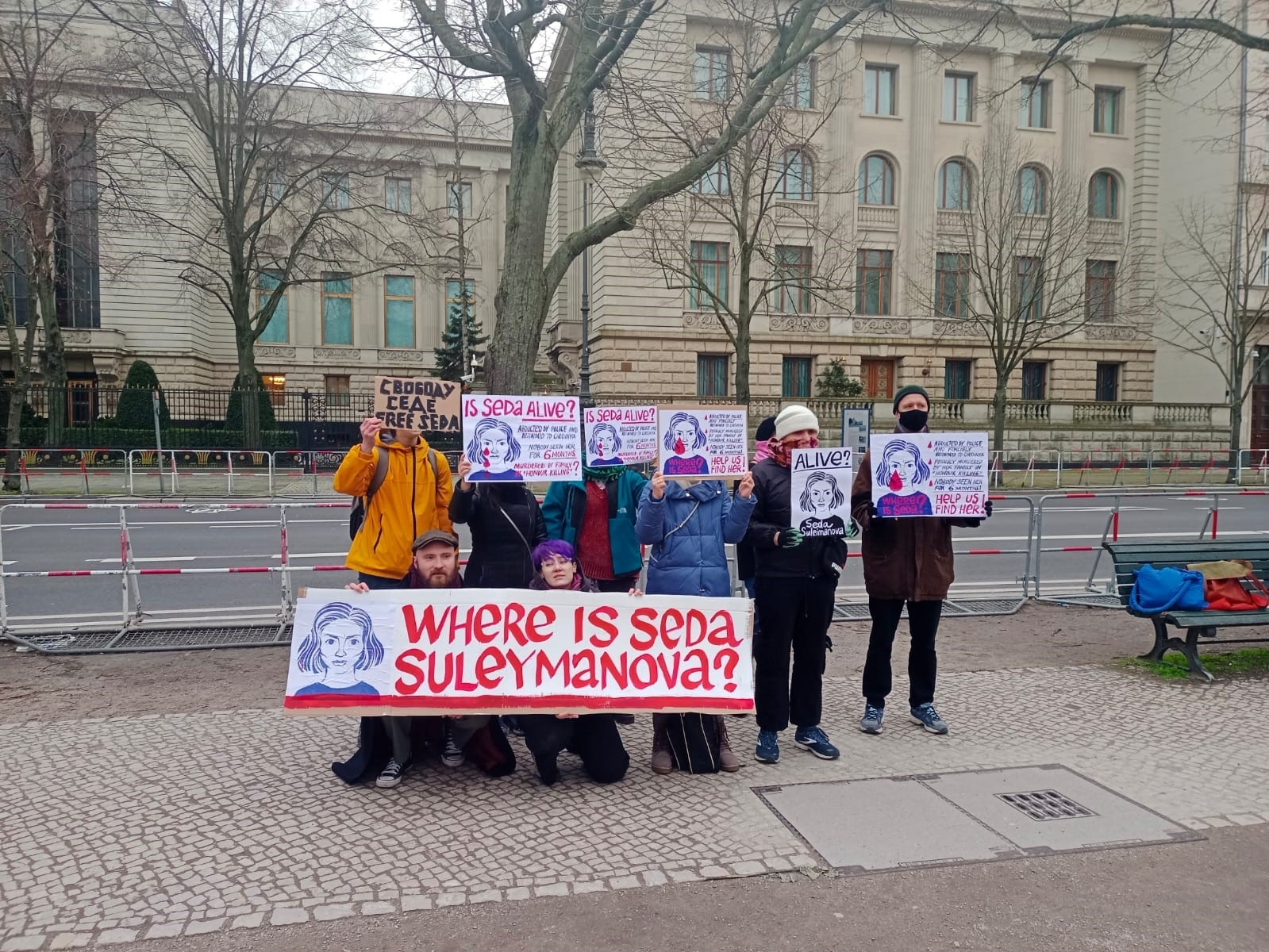On February 27, 2024, near the Russian Embassy in Berlin, passersby could view a group of young people holding posters displaying the question “Where is Seda Suleimanova?”. Seda is (or was) a young Chechen woman who escaped from her family and a forced marriage. But her relatives found and kidnapped her in Saint Petersburg, and since then – more than five months at the time of writing – nobody has heard anything from her. Those who know the situation in the Northern Caucasus, including gender researchers like me, are afraid that Seda has already been killed by her relatives, as so-called “honor killings” are happening more and more often there. Nevertheless, the people standing up for Seda hope that she is still alive and that they can help her by attracting international attention to her case. Although they are not gender equality activists and so might not know much about gender theory, they are convinced that everybody has a right to life and freedom and nobody can take that away. I came to stand with them because, as a gender researcher working on the subject of domestic violence and with colleagues from Northern Caucasus, I not only know Seda’s case well but also understand much about the disastrous situation with women’s rights in this region. I firmly believe that, as a researcher one cannot take a neutral stance, but instead needs to try to help the people one works with. This has been a characteristic feature of gender studies in Russia since the very beginning: When the field emerged in the 1990s, it was closely linked to the independent women’s movement and feminist activism. An important reference point for these new Russian feminists was the Russian feminist movement of the late 19th and the early 20th centuries, which had been forgotten during the Soviet period and was at that time rediscovered by historical research.
The “Golden Age” of Gender Studies in Russia
The period from the 1990s to the early 2000s was known as the “golden age” of gender studies in Russia as the discipline became popular in the academy, was integrated into universities’ curricula, and received financial support, mostly from Western funds. A specific characteristic of the financial support was that very often gender research projects only received funding if they had practical outcomes useful to independent women’s NGOs. This policy promoted good connections between gender research centers and the women’s movement and sometimes determined their status. For example, the Ivanovo Centre for Gender Studies, of which I am co-founder, was registered both as a university research subdivision and as an independent NGO (which later saved us from the closure). It was a period of active discussions and discoveries of Western feminist theory. Methodology and research methods were also taken from the West: liberal feminist theory, structuralism, and post-structuralism.
These features meant gender studies was welcomed by the state during the period in which the Russian Federation was open to Western liberal ideas and politics and proclaimed itself a democratic state. Gender equality and gender mainstreaming formed part of government policy, so the state required gender experts and researchers.
The Conservative Anti-Gender Turn in Russia
However, from 2008 onwards we have seen an anti-gender turn in state policy and ideology. While anti-gender turns and anti-feminist backlashes have also been witnessed globally, these have been particularly fast and extensive in Russia, systematically taking away the freedoms of gender researchers: cutting financing, forbidding the receipt of international grants, closing gender programs and courses at universities. As the state has become more and more conservative and authoritarian, gender studies’ characteristic features, which were previously welcomed, now contradict the new dominant “traditional values” discourse and appear to be hostile to the new state ideology based on patriarchy, the Orthodox religion, and the traditional family. Gender studies founded on feminist theory is viewed as a radical attempt to restructure Russian society and culture, since it opposes patriarchy and gender inequality using Western feminist approaches.
In recent years, the fight against “gender” has become part of the dominant political discourse and has meant the legitimation of traditionalist, patriarchal ideas about the family, the state, and the nation, where the head of state is the father of his people, just as the man is the head of the family. These perceptions are based on inequality, hierarchy, and exclusion (on the basis of gender, age, citizenship) and justify discrimination against those who are not included in the privileged groups.
One result of these ideological restrictions on the part of the state was cutting back the subject of gender studies in universities. Those who have stayed in academia continue their research activities but mostly in social sciences (for example, on the more conventional gender-related topics of care, aging, parenting, social status of women, women’s labor, women’s education, etc.). Centers for gender studies have been closed and gender courses excluded from the curricula of many universities and replaced by biodeterminist courses on women and family. Several well-known independent centers for gender studies, affiliated with universities, were deemed foreign agents for their participation in international programs and for receiving financial support from Western funds. Most of them had to close after that. The Ivanovo Center for Gender Studies is the last surviving gender research center in Russia in spite of this status.
Therefore, it is not surprising that in the last decade, the most original gender and feminist studies have appeared among independent researchers associated with grassroots feminist activism rather than academia. Feminists who combine academic research with activist engagement have bridged the two worlds by blogging, holding public lectures, and organizing projects at the nexus of feminist theory, art, and local politics. So, gender studies is moving from universities to NGOs and feminist groups, which are very active in studying feminist and gender theory, attempting to adapt it according to the specific situation in Russia. Once again, gender studies has entered the arena of public debates between traditionalists and supporters of modernization. I can say that the most interesting and fruitful public debates on feminism and gender are now conducted not in university classrooms nor on the pages of academic journals but in feminist groups on social networks.
War and Gender Studies
The start of the so-called “war operation” in Ukraine further aggravated the situation. For a large number of Russians, the date of February 24, 2022 divided their lives into a “before” and an “after”. Many gender researchers left Russia, expressing in that way their disagreement with state policy and with the total control of speech and writing. Those who have remained are trying to continue their studies using still-existing windows of opportunity, which are closing as universities start to exclude gender from curricula totally and books and manuals on gender studies published with the support of Western funds are withdrawn from university libraries.
I guess that this situation will lead to a severe reduction of the number of gender researchers in Russia. Several gender researchers have been fired or have left universities because of their anti-war position – a feminist approach to war and violence excludes the possibility of acceptance of war and militarism. Changes in legislation on “foreign agents” made it impossible for organizations and persons with this status (several well-known gender researchers were designated as such) to give lectures, conduct sociological research, and even receive honorariums for their work and publications, thus depriving them of their professional activities. Thus, if you want to continue to work you need to change your research interests or move out of the country.
Nevertheless, gender studies has survived, though it has become more “Russian gender studies across borders” than “gender studies in Russia.” For those who have stayed, doing gender studies in Russia is an act of civic courage: It is not only difficult but dangerous to write about gender violence in warfare, post-imperial syndrome, nationalism, and other burning issues important to many social and gender researchers.
So, the famous feminist slogan “the personal is political” has once again become applicable to gender studies in Russia, given the challenges to the discipline’s development and survival. That is why I stood for Seda, together with the young people who might not be aware of gender theory, but are still eager to fight for justice and women’s rights.
Olga Shnyrova is the director of the Ivanovo Center for Gender Studies. She is a member of RINGS (International Research Association of Institutions of Advanced Gender Studies) and the American Association of the Advanced Slavic Studies. From 2006 to 2011 she was part of an international network that produced the volume Aftermaths of War: Women’s Movements and Female Activists, 1918–1923 For this, she co-authored three articles published within the framework of the project. She contributed to the wide-ranging and international Biographical Dictionary of Women’s Movements and Feminisms in Central, Eastern, and Southeastern Europe, 19th and 20th Centuries (Central European University Press, Budapest, 2006). Olga Shnyrova edited the Russian translation of The Women’s Liberation Movement in Russia: Feminism, Nihilism and Bolshevism 1860–1930 (Richard Stites; ROSSPEN, 2004) and was one of the Russian translators of A History of Women in the West (5 vols; Aletheia, 2007–2015). She has edited 11 books on gender studies and gender education. Her Russian-language title Women’s Suffrage in the Culture and History of Britain was published in 2019 (Ivan Limbakh Publishing House, Saint Petersburg). She was a visiting researcher at the Center for Transdisciplinary Gender Studies, Humboldt-Universität zu Berlin, in 2023 and 2024.

